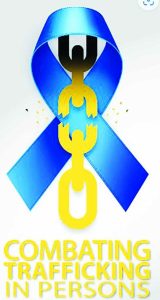Home News Opposition submits amendments to increase penalties in TIP Bill
…$10M fine for breach of confidentiality among recommendations
Weeks after the People’s Progressive Party/Civic (PPP/C) Government had laid its Combating of Trafficking in Persons Bill 2023 in the National Assembly, the parliamentary Opposition has submitted two amendments to the bill to increase penalties under the bill.
In a missive to Clerk of the National Assembly, Sherlock Issacs, A Partnership for National Unity (APNU) Member of Parliament Volda Lawrence informed that the Opposition wishes to amend Clause 13(1) and Clause 23(5) of the bill. She was seconded by her colleague Natasha Singh-Lewis.
The first amendment concerns Clause 13(1) of Part Two, which in its current form reads: “a body corporate which commits an offense under this Act is liable on conviction on indictment to a fine of $10 million.”
The Opposition is seeking to amend the bill so that the fine of $10 million is a minimum fine, allowing for increased fines to be imposed on conviction.
The second amendment, meanwhile, concerns Clause 23 of Part Three. According to this part of the bill, “a person who commits a breach of the confidentiality enjoyed by this section commits an offense, and is liable on summary conviction to a fine of $500,000 and to a term of imprisonment not exceeding six months.”
The Opposition is seeking to increase the fine to $1 million, while at the same time making the term of imprisonment at least six months. Hence, if adopted, persons found guilty can be sentenced to a fine of $1 million and imprisonment anywhere above six months.
The Combatting of Trafficking in Persons Bill (2023) was presented to the National Assembly during the 63rd Sitting by Minister of Human Services and Social Security, Dr Vindhya Persaud. According to her, the bill contains comprehensive measures to combat human trafficking. Once passed, the bill will replace the Combatting of Trafficking Persons Act of 2005.
The bill covers the recruitment, transportation and sheltering of a child for the purpose of exploiting them for use in prostitution or the drug trade. In the bill, a person’s past sexual consent or history, marriage, or their immigration status cannot be used against them. Additionally, the intentional withholding of identification papers is a criminal offence under the bill.
The transportation of anyone across the border for exploitation is also an offence that will carry, on summary conviction, a $5 million fine and up to 5 years in prison. Convicted persons can also have their assets forfeited to the state, whether local or overseas. The law also allows for restitution to be paid to victims.
Section 7(1) states: “Where a person is convicted of trafficking in persons under this act, the courts shall order that person to pay restitution to the victim, and shall be guided by information provided by the unit or any other agency or person, pursuant to the list set out in the second schedule.”
Section 8(1) states: “All property, including money, valuables and other moveable and immovable property, of a person convicted of trafficking in persons under this Act, that was used or intended to be used, or was obtained in the course of the crime, or as part of benefits gained from the crime, shall be forfeited to the state.”
Among the costs that the victim will be compensated for are: medical and psychological treatment; physical and occupational therapy; cost of necessary transportation, temporary housing and childcare; lost income, attorney’s fees and other costs; compensation for emotional distress, pain and suffering; and any other costs suffered by the victim as a direct result of being trafficked.
It was announced earlier this year that Guyana has been able to maintain its Tier One status in the United States Department of State 2022 Trafficking in Persons (TIP) Report. According to the report, “The Government of Guyana fully meets the minimum standards for the elimination of trafficking.
“The Government continued to demonstrate serious and sustained efforts during the reporting period, considering the impact of the COVID-19 pandemic on its anti-trafficking capacity; therefore, Guyana remained on Tier 1,” the report had stated. (G3)
